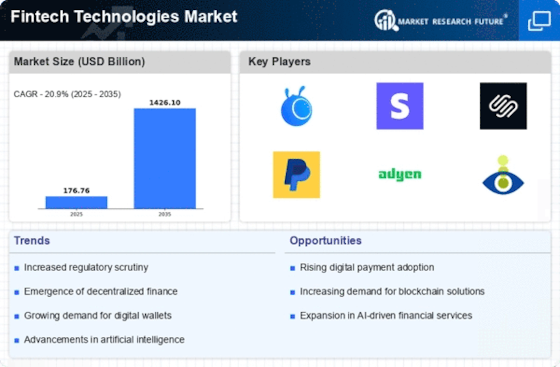Market Trends
Key Emerging Trends in the Fintech Technologies Market
Fintech has advanced and changed the global financial landscape in recent years. As people want safe and easy money management, mobile banking and digital payment solutions are growing. Most purchases now use mobile wallets, contactless payments, and peer-to-peer money transfers. Cashless transactions are growing more common.
One of the most exciting financial technologies is blockchain. Cryptocurrencies and smart contracts succeeded due to decentralization and security. Blockchain's immutability and transparency attract financial institutions despite Bitcoin and Ethereum's ascent. It may boost cybersecurity and speed up these organizations' operations. Machine learning and AI are also helping the financial technology business grow. These technology advances allow financial firms to improve customer service, speed up decision-making, and analyze huge amounts of data. Chatbots, robo-advisers, and individualized financial guidance from financial advisors have given clients better and more efficient financial services.
Meanwhile, open banking is another major trend affecting Fintech Technologies. This tendency impacts the firm. Legislation in numerous countries has led to open banking schemes. These attempts will provide third-party developers financial institution data to construct new services. The financial ecosystem is increasingly dynamic and integrated due to greater competition, collaboration, and customer-focused solutions. The ecology has become increasingly intertwined.
As customers become increasingly reliant on digital platforms, security vulnerabilities increase. Due to customer risk, the financial technology sector has prioritized cybersecurity. Organizations are investing more in security research and development, both financially and labor-wise. These programs create improved authentication, encryption, and real-time fraud detection technologies.
Financial technology firms' efforts to make financial services more accessible and inclusive are democratizing the industry. This trend includes low-cost, easy-to-use online banking alternatives like neobanks for unbanked regions.
ESG considerations also impact Fintech. Customers and investors value eco-friendly and financially prudent products. Because of this, financial technology businesses are implementing ESG into their processes, products, and investment strategies.
Financial technology has advanced due to COVID-19. Due to extensive digital communication and distant jobs, online financial services are in high demand. The pandemic's focus on digital resilience has driven financial technology companies to build robust infrastructure and disaster recovery capabilities. This responds to the pandemic's emphasis on digital resilience.



















Leave a Comment